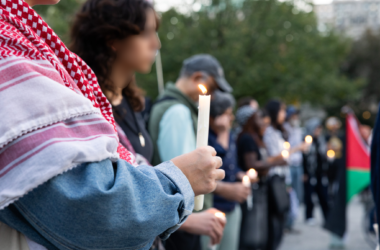 Simon Poitrimolt
Simon Poitrimolt Simon Poitrimolt
Simon PoitrimoltLast Friday, Kenyan activist and political leader Flora Terah spoke at Atwater Library in celebration of the life of the late Wangari Maathai. Maathai, who passed away Sept. 25 at the age of 71, became the first African woman to win a Nobel Peace Prize in 2004. She was recognized for her work protecting the environment, promoting sustainable development, and encouraging gender empowerment in Kenya.
“Wangari did not just plant trees for the environment. Yes, environment was key, but please remember we come from a patriarchal society,” Terah said. “Wangari did the tree planting strategically: to get to talk to women. To get the women to understand that they are human beings, that they have a role in the society, that it is their right to ask for basic human rights. This is how many of us in Kenya have followed her path. Her path was so thorny. She was beaten, jailed, put in house arrest. But she never gave up.”
Terah, an advocate for women’s rights who was abducted when she ran for Kenyan Parliament in the 2007 elections, considers Maathi a source of inspiraction and courage.
“I was tortured too, that’s the same thing Wangari felt. I knew, if she never gave up, I wasn’t going to give up,” Terah said. “Wangari has been my role model, and I feel her presence wherever I go.”
After reflecting on Maathai’s life and the inspiration derived from her life, Terah invited those present at the event to take the podium and “share this story of love from a man’s perspective.” One such person was Esmael Njuguna, currently srudying in Montreal as a Sauvé Scholar working on projects to mitigate HIV/AIDS impact and address questions of sexuality in his native Kenya. Njuguna met Maathai several times at youth leadership conferences.
“She was a humble woman, full of optimism,” Njuguna said. “This woman is my inspiration. She has really done a lot for not only the Kenyan people, but for every citizen of the world.”
Njuguna noted that environmental activism can play an important role in peacebuilding. “[A scholar in Kenya] was once asked, how is [the] environment related to peace? And he said that if we don’t have equity in the distribution of natural resources, we will always have war.”
Asked about her message to students, Terah encouraged young people to continue Maathai’s vision.
“[Students] will make a difference by doing what Wangari loved most: her passion was the environment, social change, and human rights, especially rights for women,” Terah said. “They can also lobby the Canadian government to hold the Kenyan government accountable. They are giving so much money to Kenya but not holding the leaders accountable, so the money is going into the wrong hands.”
The event was organized by a group of women interested in youth apathy and political activism. One of the organizers, Chloe Landry, a U2 honours political science major, explained that the group had originally intended to host an event showcasing Terah’s work to end gender-based violence and her courage in surmounting the challenges she has faced. However, Maathai’s passing led Terah to prefer honouring her friend and mentor.
The event was an occasion for those present to reflect on issues of gender discrimination. Amy Tang, a U1 psychology student, spent the summer volunteering in Kenya and said the event inspired her to rethink some of the situations she witnessed.
“I met a man who was telling me his belief that it’s the man’s place to discipline the woman, to control his household, almost as if the woman was another child,” Tang said. “At the time, I didn’t think too much about it. I got a little ticked off, but thought ‘I’m a visitor, I’m not going to come into this man’s home and argue with him.’ But as I’ve come back and I hear more about [these abuses] I realize that sometimes the issue is culture but oftentimes it’s just human rights. Period. Sometimes you’ve got to say, ‘Hey, this is wrong.’ You have to speak out.”
Terah’s poignant speech and the legacy of Maathai’s life resonated with many of the people in the event.
“[Maathai] saw tree planting as a way to reduce poverty, as a way to help women and as a way to help [the] community,” Landry said. “There’s an interconnectedness of issues. You don’t have to conquer all the isses because some things can really make a difference on a wide range. I find that is a very powerful message.”





